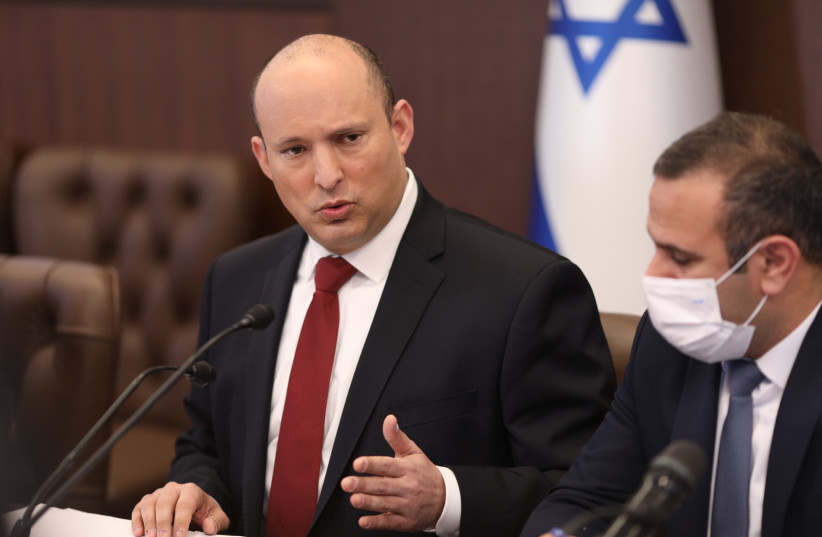Israeli presidents and prime ministers do not normally act as the advance guard for visits abroad by foreign ministers, but that is how events panned out in the dying days of 2021. All three chanced, or managed, to visit the UK during November.
By the time Foreign Minister Yair Lapid touched down at London’s Heathrow at the end of the month, both President Isaac Herzog and Prime Minister Naftali Bennett had come, held the friendliest of exchanges with UK Prime Minister Boris Johnson, and his new foreign secretary Liz Truss, and departed. Lapid, his path made smooth for him, scored a remarkable success in the UK, echoes of which still reverberate.
“British-Israeli relations have entered a golden era,” trumpeted a headline in the UK’s prestigious Jewish Chronicle a week or so after Lapid had left. The article, by editor Jake Wallis Simons, claimed that British officials and parliamentarians were “falling over each other in their love for the Jewish state.”
Warm sentiments begin at the top. Before leaving for Britain, Herzog said he and Johnson had known each other for many years, describing him as “a true friend of Israel.” Turning to the issues he intended to raise, Herzog said: “I shall thank him for the British government’s decision to recognize Hamas as a terrorist organization, with all that entails… I shall make clear that Israel cannot allow Iran to acquire nuclear weapons capability, and it expects its allies to be tough and assertive toward the Iranians, including in their dialogue with them.”
Back in July, shortly after Bennett had formed his coalition government, Johnson was on the phone inviting him to the UK. Bennett flew to Britain on November 2 to attend the international COP26 meeting, hosted by the UK in Glasgow.

Meeting Johnson, Bennett said: “You’re a huge friend to Israel; that’s no secret. What we’ll be discussing is how we bring our relationship to the next level.”
With so much goodwill between Britain and Israel already expressed, and the groundwork firmly laid, Lapid did not face a difficult time when he landed in the UK on the final days of November. Even so, he could scarcely have anticipated the diplomatic success he achieved.
In his Jewish Chronicle article, Simons revealed he had been present at 10 Downing St. for a Hanukkah reception attended by Johnson and Lapid. The chemistry between them, he wrote, was obvious.
“They had spent all day together, an honor that is not normally accorded to a visit from a prime minister of a country with a population of less than 10 million,” let alone, he might have added, a mere foreign minister.
Their close relationship, he asserts, is based on the time, 10 years before, when the two of them as journalists had enjoyed Tel Aviv’s nightlife together. Lapid himself, in a media interview on December 24, confirmed that he has cherished a close personal friendship with Johnson for many years.
ON THE day after Lapid arrived, The Daily Telegraph achieved a journalistic coup – an article written jointly by the British and Israeli foreign ministers, Truss and Lapid. With the headline: “Together we can propel both our nations to safety and prosperity,” the piece heralded a new UK-Israeli agreement, to be signed later that day, which the foreign ministers described as “a major step forward, transforming our close friendship into an even closer partnership by formally agreeing to a new strategic plan for the next decade-spanning cyber, tech, trade and defense.”
Lapid later described this UK-Israel Strategic Partnership as “a major moment in the relationship between the UK and Israel.”
The ministers noted that Israel and the UK have already built up their bilateral trade to an annual £5 billion (nearly $7 billion), and quoted two major examples: the UK’s Rolls-Royce is supplying jet engines to Israel’s national airline, and the Israeli pharmaceutical giant Teva is supplying one out of every six medicines prescribed in the UK’s National Health Service.
In a further agreement, Israel and Britain opened negotiations on a new free trade deal which would help both nations seize new opportunities in the industries of the future. Moreover, Israel will officially become a Tier One cyber partner for the UK.
Lapid had stopped off in the UK on his way to attend the latest round of talks, being held in Vienna, on reactivating the nuclear deal between world powers and Iran. One of the most eye-catching aspects of the joint article by the two ministers is a renewed commitment to stop Tehran ever getting nuclear weapons.
Making President Herzog’s earlier ask of Britain a reality, they affirmed that the UK and Israel will “work night and day to prevent the Iranian regime from ever becoming a nuclear power. The clock is ticking, which heightens the need for close cooperation with our partners and friends to thwart Tehran’s ambitions.”
The joint article concludes: “Israel and the UK are the closest of friends, and today we are deepening that partnership to become even closer. Together, we will forge ahead and ensure the future is defined by liberal democracies who believe in freedom and fairness.”
That is as firm an expression of friendship and solidarity between two nations as it is possible to envisage. Notable by its absence is any reference to the Israel-Palestinian dispute, the two-state solution, the expansion of settlements, or any lack of proportionality in Israel’s response to being bombarded with rockets and missiles from the Gaza Strip.
Doubtless, Britain has an official policy on these matters which possibly varies from Israel’s. Given the new warmth in UK-Israeli relations, might a chance exist for the two nations to reach a common view even on these? That is a matter for Lapid to ponder, while he awaits his turn in the prime ministerial chair.
The writer is Middle East correspondent for Eurasia Review. His latest book is Trump and the Holy Land: 2016-2020. Follow him at: www.a-mid-east-journal.blogspot.com
